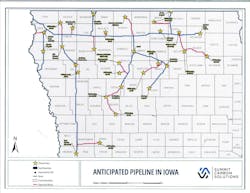Summit gets favorable ND Supreme Court ruling, advances CCS pipeline in Iowa
Loren G. Flaugh
Primghar, Iowa
Summit Carbon Solutions (SCS) in late May received a ruling from the North Dakota Supreme Court affirming its ability to access private property without prior permission for the sake of surveying potential routes for its planned 18-million tonne/year (tpy) Midwest Carbon Express CO2 pipeline. The ruling stands in contrast to events in other jurisdictions.
Omaha-based Navigator CO2 Ventures LLC said in an Oct. 20, 2023, press release that "due to the unpredictable nature of the regulatory and government process involved, particularly in South Dakota and Iowa," it had decided to cancel its proposed 1,300-mile carbon capture and sequestration (CCS) pipeline project through five upper Midwest States.
This development opened up an opportunity for two of Navigator’s major shippers, Sioux Falls, SD-based POET LLC and San Antonio, Tex.-based Valero Renewable Fuels Co. LLC, to join Midwest Carbon Express. On Jan. 29, 2024, SCS and POET announced a partnership and roughly 2 months later SCS said that eight of Valero’s ethanol plants across Iowa, Nebraska, Minnesota, and South Dakota were expected to be incorporated into its CCS project. The addition of POET and Valero brought contracted capacity on the system to 16 million tpy, according to SCS.
Later in March, SCS filed with the Iowa Utilities Board (IUB) to hold public hearings in 23 counties regarding its proposal to build 340 miles of 6-8 in. OD pipelines that would connect POET and Valero’s plants to its proposed 2,000-mile Midwest Carbon Express pipeline.
On Mar. 19, 2024, senior project manager Grant Terry and stakeholder relations manager Kaylee Langrell attended an O’Brien County, Iowa, board of supervisors meeting. Langrell reported that with the addition of POET and Valero there were now 57 total ethanol plants expecting to ship their liquified CO2 through the proposed gathering pipeline system to a central North Dakota sequestration site.
While referring to an updated O’Brien County pipeline route map, Langrell said that a new 6-in. OD lateral will exit a proposed 24-in. OD mainline valve site in the western part of the county heading north and terminate at POET’s Ashton ethanol plant in Osceola County. About 12 miles east along the SCS 20-in. mainline, an 8-in. OD lateral will exit a proposed valve site and head north to the large Valero Renewables ethanol plant just west of Hartley.
Langrell also indicated that all the mainline pipeline diameters, normal operating pressures, and the number of booster pump stations will remain unchanged from Summit’s original design specifications.
With the addition of all the new lateral and trunkline routes, "the IUB must host additional landowners' informational meetings along these two new lateral pipelines. In O’Brien County, we’ll be having an informational meeting where everyone within the two new notification corridors will be notified," Langrell explained. These meetings could happen as early as the first 2 weeks of August 2024.
All the new lateral and trunkline pipeline routes will require an additional public evidentiary hearing hosted by the IUB at a location to be named later. Langrell said the IUB hosted the public evidentiary hearing last fall for the original construction permit application that SCS filed back in 2021.
Essentially, this project could result in two IUB construction permit determinations. A decision on the first, addressing the original 2,000-mile route, is due at any time. Decisions on the second permit, addressing the POET and Valero laterals and trunklines, might not happen until late 2024.
Construction duration
With the POET and Valero routes included, a total of about 2,500 miles of pipeline will be built. One community member asked if the work could be completed in a single construction season. "It depends on what the IUB rules at the end of the day. It can all be done in one construction season, yes. It all depends on what the IUB says, and if we can get enough inspection staff for each pipeline spread, enough construction workers and building materials," Terry answered.
IUB director of communications Don Tormey cited information SCS provided in a 2021 filing in an email response addressing construction guidelines. “For construction which might occur in Iowa, the public informational meeting schedule filed by Summit Carbon in Docket No. HLP-2021-0001 indicates it will take approximately a year to a year and a half to construct the proposed hazardous liquids pipeline." Tormey also noted that in the 2016 Dakota Access pipeline docket, the IUB issued an order approving a winter construction plan in order to allow construction to continue during the winter for that project.
Langrell estimated the total project cost, assuming 2026 completion, at roughly $8 billion. As of April 2024, 82% of voluntary easement agreements in Iowa had been acquired at a cost of $157 million.
SCS director of stakeholder engagement and corporate communications Sabrina Ahmed Zenor added that installation of Midwest Carbon Express and its 57 CO2 capture sites and multiple booster pump stations would involve "multiple top-tier pipeline contractors" each deploying multiple spreads, as well as separate contractors for the capture infrastructure. She added that "Summit’s construction management team has been working with a select group of preferred contractors for more than a year" refining project execution.
"Summit Carbon Solution is a common carrier pipeline," Zenor continued. "CO2 is a commodity, and the company will move CO2 for companies for a fee. CO2 is a valuable commodity. Permanent sequestration generates carbon credits that can be sold in an open market. The capture and permanent sequestration will also allow partner ethanol producers to sell their ethanol at a premium, due to a lower [carbon intensity] score."
Author
Loren Gaylord Flaugh is a freelance writer based in Primghar, Iowa. Previous work includes more than 12 years with Dresser Engineering, many of them spent as a power and control technician on pipelines and other petroleum sites in numerous states. Flaugh graduated (1966) from Paullina Community School in Paullina, Iowa, before enlisting in the US Navy Reserve Seabees and serving in Vietnam.
